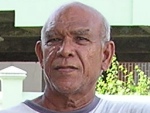|
|
|
The Story of Hosay: Dancing the Moon |
Michael Goring Speaks on Hosay
Pages: 01 | 02 | 03 | 04 | 05 | 06 | 07 | 08
Staff Article
Interview Recorded: May 25, 2005
Posted: June 27, 2005
Mr. Michael Goring is considered one of the most informed Elders on the St. James Hosay. Our recorded interview with him allows us to share his story of the local Hosay. Mr. Goring also shares some of his views on life in general. Visit the Hosay album at: www.trinisoca.com/gallery/hosay.
The procession is not a festival

Michael Goring
|
At around the age of seven I started helping in the preparations and the making of the things for the Hosay. Hosay is really commemorated in the tenth month, the Muharram month, and the big day is the day of Ashura; that is the night that the Hosay comes out. The Tadjah comes out on the tenth night. Prayers start ten days before, and then on the eighth night, you have 'Flag Day', which is most important for the Hosay. The flag symbolizes the body. The small Tadjah is the coffin, and the large Tadjah is the tomb. The procession is not a festival as people call it. It is a procession in commemoration of the 'Grandsons of the Prophets'. Those who do the work, or those who partake in helping to build the Tadjah, are supposed to build it within thirty days. You abstain from all meat, all sex, and if it is possible, you live in the Mumbara.
The Mumbara is where you build the Tadjah. You cannot get help now because things have been so different, achat levitra en ligne. You have women helping, which is something that is not supposed to happen. They even go into the Mumbara to help. We have been taught that the women are there to prepare things for it, but not to actually help with the building, because when the women's monthly comes around, very rarely they will tell you. They have taught us that it is an unclean period. We, who have been in it and have studied it, do not think that it is an unclean period. But if and when the fast starts, they must be honest about whether or not they are having their monthly. They must stay away and not partake in doing anything for those ten days. Somebody else in the household will have to do it.
The people who keep the fast are most times the elders who are building it. We were trained from young that we have to do the prayers whether you can speak Hindi or whatever. You can say your prayers the way you know how to say it. Hosay is not the religious occasion that people believe it to be. You use prayers in it the same way you use prayers as if you were building something, and you give thanks for the privilege of building it. When the Tadjah is being built, those who do the fast try their best to do it from 6am to 6pm. Ten days after the prayer you can have a prune, a banana and a little milk, but you do not stuff yourself. On the night of Ashura, when meals are prepared, it is prepared for the people who have done their part viagra otc. They are the first ones who are supposed to get from that meal; to break the fast.
When you have the 'Prayer on the Night', you wash the Chowke after prayers before you come out of the yard. We go around with our prayers seven times, which they call Chalaway. Even from a very young age I have been privileged because the builder, who was too old then, saw something which he felt I could do, and he asked me if I would to it. Before the prayers starts you get a clean glass of water. Whoever the Imam is (that's the man who is going to say the prayers), you hand it to him and he would say a few words on that water, hand it back to me, and I would bless the building. There are aspects of things which people see, but they do not ask about them because they are not interested. Even the young ones who are seeing things that they do not know or understand; they would not ask you anything.
On the night of 'The Flags' before we come out on the streets, when you lift them off the prayer area (the Chowke), somebody like myself will throw a bucket of water. You put it on the streets and it stays there for about five to fifteen minutes. Before they move it again, and while they are moving, you throw another bucket of water. Doing this signifies you are washing away the dead.
You do the same thing the following night with the small Tadjah. When that small Tadjah has made the routes on the procession, it doesn't go back to the yard. It goes to the sea. The person who is taking it out has to take it out in water. You do not just throw it in the mud and leave it. You push it away and then you walk away. The big one goes into the sea, but it goes a day after being on the Chowke. So you have the day that it came out, and as far as we who have built it after our prayers, it is dead for us. We are not supposed to do anything with it. We drag it through the streets so that the people who have contributed towards it can see what we have done. We also accompany the Moon Men (the people who dance the Moon), because they go to Q.R.C. grounds for their prayers.
Continue...
Pages: 01 | 02 | 03 | 04 | 05 | 06 | 07 | 08
|

|

